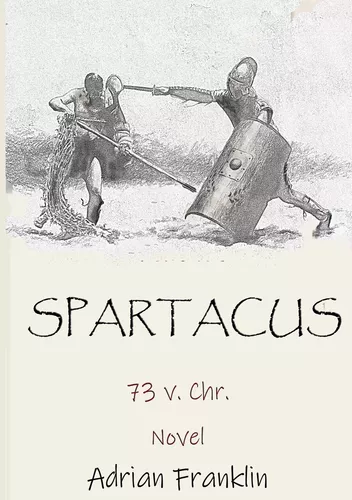Skip to the end of the images gallery Navigation umschalten
Skip to the beginning of the images gallery Navigation umschalten

Spartacus
73 v. Chr.
ePUB
689,6 KB
DRM: Wasserzeichen
ISBN-13: 9783757896478
Verlag: BoD - Books on Demand
Erscheinungsdatum: 31.03.2023
Sprache: Englisch
Barrierefreiheit: Eingeschränkt zugänglich
erhältlich als:
5,99 €
inkl. MwSt.
sofort verfügbar als Download
Du schreibst?
Erfüll dir deinen Traum, schreibe deine Geschichte und mach mit BoD ein Buch daraus!
Mehr InfosPrologue
"...some are marked out for subjection... he, who is by nature not his own but another's man, is by nature a slave; and he may be said to be another's man who, being a human being, is also a possession."
Aristotle, Politics, 1254b1-21.
Year 73 B.C.
Nothing foretold an uprising when a small group of gladiators managed their escape from the school in Capua.Rapidly develops a wildfire, spreading across the entire land.
Under the leadership of the Thracian Spartacus, they defeated the Roman legions time and time again, - forces renowned for their victories across the known world.
Advanced as far as the Alps they did, before turning south once more in a bid to escape the peninsula
Spartacus, a Thracian, not really tangible from the mists of history, - compared to Hannibal or Alexander, there are hardly any written records about him.
Hannibal is, above all, the battle of Cannae. Spartacus has no recorded battle that eclipses all others, no crossing of the Alps, only a tale told in familiar strains, shaped more by legend than by history.
This novel attempts to portray the uprising as, -»The Attempt Of The Impossible«.
The film Blade-Runner (despite a completely different genre) has been a blueprint for the form of making the impossible, subtly, visible. There is no similarity to the plot, or the characters, it is the form/idea of depicting the impossibility of an undertaking.
"...some are marked out for subjection... he, who is by nature not his own but another's man, is by nature a slave; and he may be said to be another's man who, being a human being, is also a possession."
Aristotle, Politics, 1254b1-21.
Year 73 B.C.
Nothing foretold an uprising when a small group of gladiators managed their escape from the school in Capua.Rapidly develops a wildfire, spreading across the entire land.
Under the leadership of the Thracian Spartacus, they defeated the Roman legions time and time again, - forces renowned for their victories across the known world.
Advanced as far as the Alps they did, before turning south once more in a bid to escape the peninsula
Spartacus, a Thracian, not really tangible from the mists of history, - compared to Hannibal or Alexander, there are hardly any written records about him.
Hannibal is, above all, the battle of Cannae. Spartacus has no recorded battle that eclipses all others, no crossing of the Alps, only a tale told in familiar strains, shaped more by legend than by history.
This novel attempts to portray the uprising as, -»The Attempt Of The Impossible«.
The film Blade-Runner (despite a completely different genre) has been a blueprint for the form of making the impossible, subtly, visible. There is no similarity to the plot, or the characters, it is the form/idea of depicting the impossibility of an undertaking.
Eigene Bewertung schreiben






Es sind momentan noch keine Pressestimmen vorhanden.